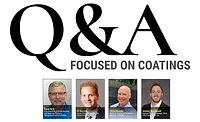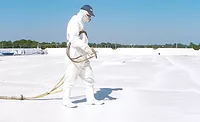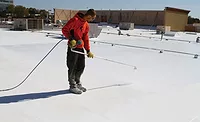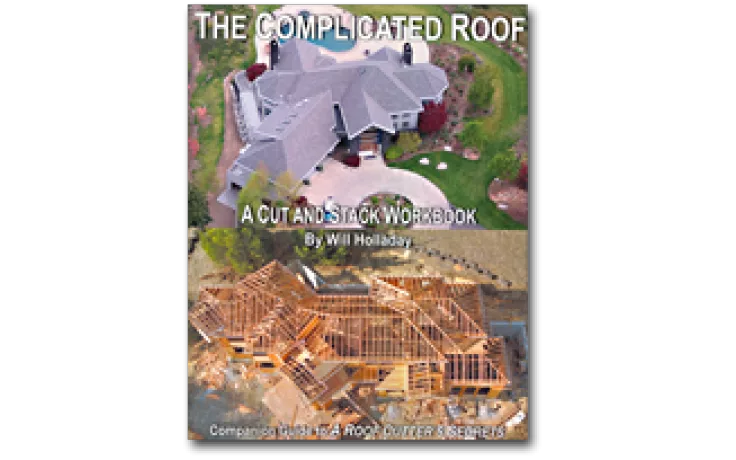RC Coatings Special Section: COATINGS Q&A
Dan Quinonez and Chadwick Collins of RCMA
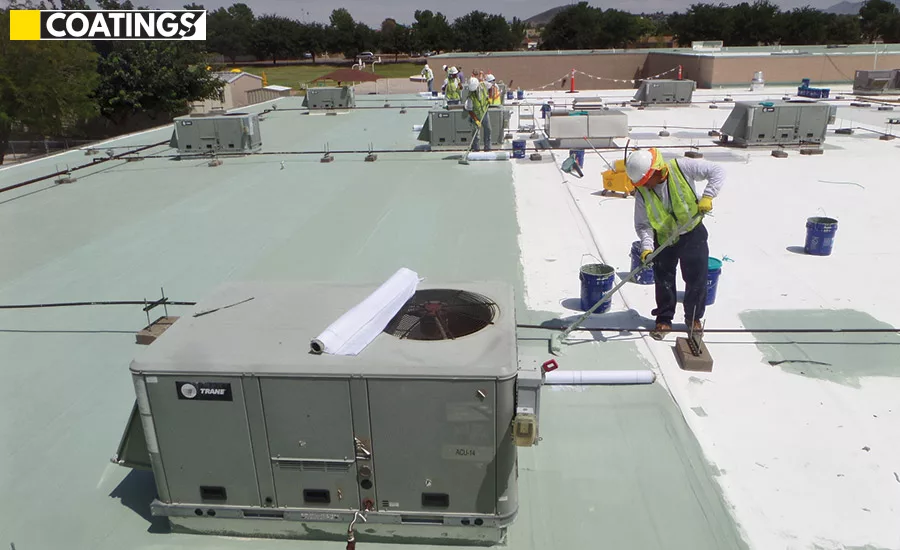
Roof coatings are designed for protecting and extending the useful service life of roof assemblies for new construction and more commonly, existing roof coverings, such as BUR, metal, modified bitumen, single ply membranes, and spray polyurethane foam.
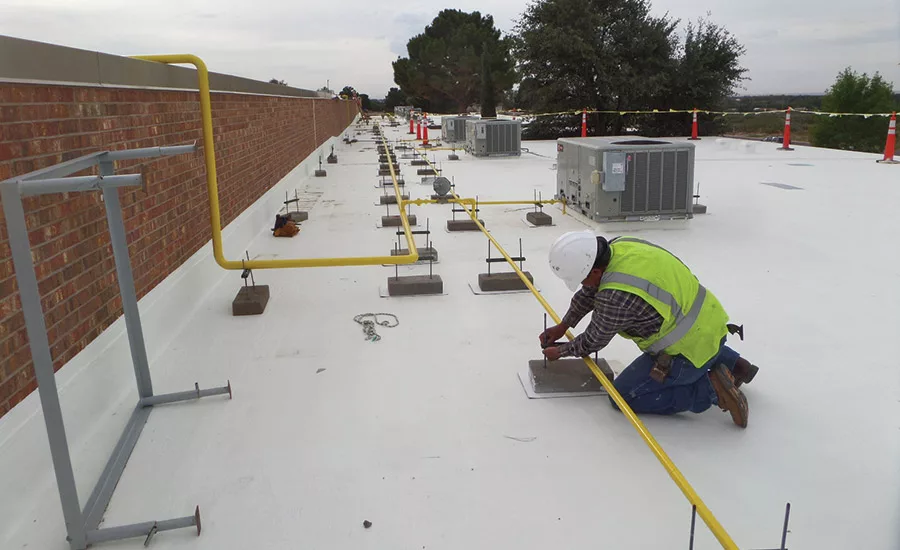
Coatings are always an attractive option when it comes to maintaining or extending the life of a current roofing system. Due to the pandemic, the RCMA believes coatings are being widely considered for roof replacement or re-cover projects.
Like many other sectors of the roofing industry, the coatings market entered 2020 with a lot of positive momentum. Then COVID-19 arrived. Though certainly disrupted by lockdowns, health and safety concerns and delayed projects, the news for roofing contractors that offer coatings wasn’t all bad.
To offer some perspective on the pandemic, and how the industry can re-emerge, RC recently asked Dan Quinonez, executive director, and Chadwick Collins, director of technical services of the Roof Coatings Manufacturers Association (RCMA) the following:
RC: Describe the state of the roof coatings market prior to COVID-19?
RCMA: The coatings market was strong prior to the outbreak of COVID-19. Our members were looking forward to 2020 and there was a sense of momentum as the industry addressed several items to continue to support the growth of this market.
RC: What were the chief areas of concern among members at that time?
RCMA: Our members’ concerns were varied. Individually, members were having to address standard business concerns: logistics challenges, raw material market forces, etc. From an industry perspective, the constant issues that contractors face finding and training personnel, as well as various regulatory items, were the main concerns.
RC: Why was it a good time for roofing contractors to be in the coatings market?
RCMA: We always view it as a good time for a roofing contractor to enter the coatings market. The benefits of having coatings as a service offering in the contractor’s portfolio remains the same. The ease of entry to the market, the breadth of coating options available, and the substrates that coatings can be installed over were drivers for contractors before and are still benefits now.
RC: How would you describe the state of the coatings market now?
RCMA: In most areas, roofing and associated manufacturing support were designated as essential industries, so we’ve been able to remain (mostly) in operation. There were certainly challenges relating to general economic contraction at the onset of the pandemic, but to-date, we have fared better than many industries. Many sectors have adopted a stance of maintaining the status quo and focusing on maintaining and lengthening the service life of the system in place instead of pursuing re-cover or reroofing projects. This isn’t just impacting coatings, but the roofing market.
RC: Have your membership’s concerns and outlooks for 2020 changed?
RCMA: Like nearly everyone, the projections and outlooks that many of our members had for 2020 have been impacted and have needed adjustments. Understandably, our members’ updated outlook is being impacted based on individual state and municipality response procedures to the pandemic. Our members and similar associations in the roofing and construction industry have been effective in getting acknowledgement of the essential nature of our work and all of its supply chain links. Once again, the people in our industry, from the contractors to the manufacturers, worked to find a solution to keep roofing functioning.
RC: How did the pandemic impact the RCMA’s mission?
RCMA: Our immediate focus shifted to helping our members navigate the pandemic and joining with our sister industry organizations to support efforts to have roofing declared an essential industry and get contractors back to work. Other than these new priorities, and a shift from in-person events to virtual events and video conferences, RCMA’s mission has not changed, and we have found ways to serve the needs of our members. We have been able to illustrate the value of an association as we tackled many advocacy challenges over the past few months.
RC: Have new health and safety guidelines related to the pandemic had a big impact?
RCMA: Safety has always been a focus in the roofing industry because of the inherent risks associated with it. Because many of these activities necessitate the use of PPE already, many stakeholders already had PPE programs in place, which just needed updates to reflect the use of new PPE or behavior/process changes when compared to some other industries that had to build a PPE training program and create a culture of compliance from scratch. We expect that new challenges will be faced in all industries, but RCMA’s previously established plans and commitment to safety should keep us ahead of the curve.
RC: What were the first indications that COVID-19 could have devastating economic ramifications?
RCMA: Widespread shutdown and shelter-in-place orders were an obvious red flag. Even in areas where our members were deemed essential, the sheer unknown nature of the virus and its effects, coupled with projected devastating consequences, told us we were in for the long haul.
RC: How will project delays, cancellations impact the market?
RCMA: This will be a long and arduous recovery. With many building owners shifting from reroofing or roof re-cover projects to maintaining and life-cycle extension projects on currently installed systems, the impact to the market is clear. For coatings … we’ve seen some positive signs.
RC: Will coatings become a more attractive roofing solution in leaner times?
RCMA: Coatings are always an attractive option when it comes to maintaining or extending the life of a current roofing system. Due to the pandemic, we believe coatings are being widely considered for roof replacement or re-cover projects. The required equipment, ease to stage material, and personnel requirements are all benefits that have added value in the setting of this event.
RC: What are the biggest innovations developed during this crisis that are here to stay?
RCMA: From an association perspective, changes to the ways businesses are operating (remote working, video calls) are the clear takeaways so far. In regard to products, the nature of our industry is that it takes time for innovation or trends to be accepted as a valued option. This event will be no different. It will be a bit before we are able to look at something that came out during this time as a result of COVID-19 and accept it as a viable option in the marketplace.
RC: Are there concerns about supply-chain problems in the coatings market?
RCMA: We are grateful that the importance of our industry, as well as those industries that support us and those that we support, continues to be recognized for their necessity. As long as that ecosystem (from raw materials to contractors) can continue to function, we expect to continue as we have during this event. However, while there are restrictions anywhere in the world, we expect some supply chain disruptions.
RC: Why is the RCMA pushing for improved training this year?
RCMA: Training has always been a key focus for our association, and our plans to update previous training material predate COVID-19. With the shift to and wider acceptance of virtual-based training, our efforts have shifted to provide our program in that format quickly. Our membership is excited about the potential reach of this program and it seems, fortunately, that we timed this endeavor correctly.
RC: How is the RCMA attacking the barriers for entry for contractors to get involved with coatings?
RCMA: We are hopeful that our marketing and ease of application for our products will help clear any hurdles. As with any technology in any field, there will always be a small segment reluctant to accept anything new. Fortunately, we believe that is a very small segment in the contractor market. Our experience is that contactors want a broad portfolio of options to present to their clients, since it is far better to have a toolbox of solutions to help their customers.
RC: What’s exciting about the future of roof coatings?
RCMA: RCMA is interested in opportunities to develop economic incentives for application of roof coatings. More specifically, we believe that opportunities may exist to create new tax credits for the installation of more energy efficient or sustainable products. With the sun-setting of EnergyStar we lost an important tax credit for consumers.
There are various types of roof coatings on the market that can benefit any type of roof. From a sustainability standpoint, we champion the benefits of the application of coatings as a measure to prolong the life of existing roof coverings, thereby reducing the impact of waste, as well as increased energy efficiency through the roof coating industry’s commitment to cooler roofs. The sky is the limit!
Looking for a reprint of this article?
From high-res PDFs to custom plaques, order your copy today!





